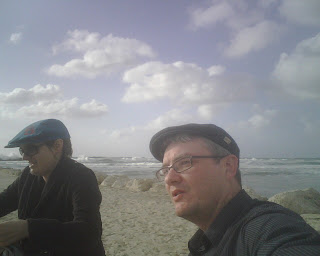A Short Reflection on the Evolution of My Prayer Life in Jerusalem
 (Picture note: I like to walk along this face of the city walls towards Mt. Zion and enter the Old City through the Zion Gate. This is the view. I am having a good year.)
(Picture note: I like to walk along this face of the city walls towards Mt. Zion and enter the Old City through the Zion Gate. This is the view. I am having a good year.)Something rather magical has been happening during my time here
Now maybe this is a silly statement. I mean, after all, our sages warn us of the dangers of praying words that have no meaning to us. Some of the most pious among us meditate seven seconds on every word in the Amidah—so my statement bears a little concern.
Up until this time, I have escaped most concern by understanding that I was in a process of learning the language. Certainly none of us pop out of Mother’s womb fully intact as fluent comprehenders of the Holy Language. Surely I must be allotted some time to catch up for the thirty-some years I spent reading King James English as the “Holy Language.”
The moment of enlightenment came at home, laying Tefillin in personal devotion (this is not an evolution—there are simply some days that I need to pray by myself instead of in a minyan) and I came to the Elohai Neshama. Now I know what this prayer means – I have prayed it now hundreds of times, and at my synagogue in
So I say the prayer with kavanah, but always with a mehitza stuck between the words I chant in Hebrew and the translation that the good folks of the Gates of Prayer gave to me.
So I started chanting . . . “Elohai . . .”
But wait. That is not “G-d,” that is “my G-d.” I recognize that ending—that yud. It makes this personal. It makes this statement an acknowledgement of a direct relationship.
Neshama. I know this too. But as I have broken down the mehitza and as I am looking at the words for the first time with sound and meaning joined, I am actually thinking of this-- neshama and not nefesh or ruach. The prayer is about breath-- the beginning-- the essential truth that at the first moment when life claims life by being born it is or becomes that thing which is pure.
And pure!
It is a little embarrassing, but tehora sounds like Torah and so from the other side of the mehitza I never let myself think of the actually meaning. But I just studied this! This is a priestly word that hardly appears until Leviticus. Tet – Hey – Resh, not Tav for Torah – Pure – A ritual state that exists as a combination of choice and work and luck and circumstance. This is what I am gifted and breath as prayer every morning? Not that I am filthy and unworthy but rather that by the gift of Ribon Ha’Olam I get to start life with the assumption that I have value in this continuous act of creation called life? And my tradition suggests that I pray this every morning? Who is this prayer for? Who is prayer for? Doesn’t this force me to challenge my base assumptions of spirituality?
Even if I take this thought purely metaphorical, I must wonder how universal teaching of the profound worth of each of us from the breath of birth could transform the world.
Now the mehitza is torn. I don’t have it all yet—not even close. But now every day in prayer on more word steps up. Pay attention to me! Pay attention to this shoresh that you learned and how the potential infinity of meanings is so much more enlivening than a translation engraved onto plates that sets our daily thoughts into a box.
I mean, we need the box. We all have to start someplace. But to experience reading a word that can change your day or even your life—one word—and how many do we have in Torah? The bigger Torah? This is a magnificent path.
May it be so that this simple evolution of my personal prayer life so far in Jerusalem may allow me to help even one other feel the same sense of awe and transformation
Comments